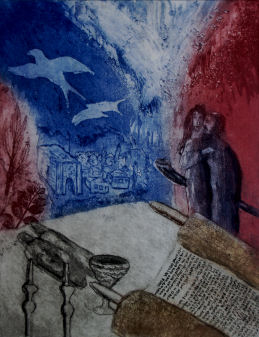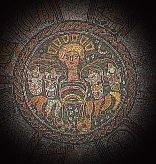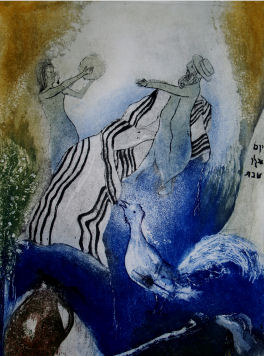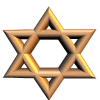Etchings of Marcus van Loopik
The days of creation
|

The seventh day of creation
And the heaven and the earth were finished, and all the host of the. And on the seventh
day God finished his work which He had made; and He rested on the seventh day form all His
work which He had made. And God blessed the seventh day, and hollowed it; because that in
it He rested from all His work which God in creating had made (Gen. 2:1-3) .(Etching
M. van Loopik)
|
This etching is inserted as illustration in the 'Lezenaarbijbel', publiced by
the 'Katholieke Bijbelstichting ( Roman catholic Bible society ; 's - Hertogenbosch 1998),
and provided with the following explanation.
|
The Sabbath day - queen of the creation and 'firstling' of
the festivals
For some one who celebrates the Sabbath day with full dedication, this day brings about a
deep spiritual experience. For a moment she raises man above the grief and misery of daily
life. The Sabbath day is a piece of messianic fulfilment and as it were an oasis in time.
In the sensitive words of the Jewish thinker Abraham Jehoshua Heschel we notice the
vibration of lively experience and celebration: 'The Sabbath is an assurance that
the spirit is greater than the universe, that beyond the good is the holy. The
universe was created in six days, but the climax of creation was the seventh day.
Things that become into being in the six days are good, but the seventh day is holy. The
Sabbath is holiness in time. What is the Sabbath? The presence of eternity, a moment of
majesty, a radiance of joy. The soul is enhanced, time is delight, and inwardness a
supreme reward' (A.J. Heschel, God in Search of Man, New York 1955, p. 417). 
The Sabbath has already been given to Israel before the revelation of the Torah on mount
Sinai. According to an old explanation God said to Israel: 'If you appear to be worthy and
if you keep the Sabbath day, the Holy One, blessed be He, will give you three festivals in
the future: the Passover, the Feast of Weeks and the Feast of Tabernacles.' With the
Sabbath day God tested Israel. He wanted to know whether they were willing to accept His
word and to celebrate the other feasts-days. The Sabbath day is the queen of creation and
the 'firstling' of the feasts. Only she is the measuring-rod of the days. Until the
present day Hebrew speaking Jews reckon their days by means of a number, in accordance
with the story of creation. The days do not have their own names. In her mind the Jewish
community is always on the way to the next Sabbath day, which makes her to taste a touch
of messianic happiness. Once all nations will share the Sabbath with Israel: For My house shall be called a house of prayer for all peoples (Jes.
56:7).
Because the etching is about the messianic age, a blue color is used. The color blue
refers to things that surpass reality. Man and wife celebrate the Sabbath day. The dancing
couple reminds us of the first man and his wife Eve in paradise. The light, which enters
the scene from above, is the extra soul which righteous people may receive on this day.
Birds, fishes and other animals are part of the creation story, but they also show
the concrete character of the messianic dream. Nature takes part in the messianic future,
even the fish rise in the air, full of joy. In a timeless moment past, present and future
mingle together
|

The eighth day of creation - the day of the World to Come
And I appointed the eighth day also, that the eighth day should be the first-created
after My work and that the first seven revolve in the form of of the seventh thousand, and
that at the beginning of the eighth thousand there should be a time of not-counting,
endless, with neither years nor months nor weeks nor days nor hours (II Henoch 33:1-2).
(Etching M. van Loopik)
|
This etching is inserted as illustration in the 'Lezenaarbijbel', publiced by
the 'Katholieke Bijbelstichting' ( Roman catholic Bible society ; 's - Hertogenbosch
1998), and provided with the following explanation.
|
The eighth day - a time without days and without months
With the eighth day we leave the area of creation and even step across the boundaries
of the messianic age. The eighth day does not fall within world history and the human task
to sanctify time. According to an old explanation the story of creation reflects the
history of the world. The creation-story does not inform us about normal days,days which
last 24 ours, but about the 'days' of God, days of 1000 years as is said in the Book of
Psalms: For a thousand years in Your sight are but as yesterday when it is
past and as a watch in the night (Ps. 90:4).
These words are only a poetic figure of speech. Who can say how long a day of creation
really lasts?
World history goes on six days, until a period of rest and fulfilment will start at the
beginning of the seventh day. From then on people will not longer toil on the fields of
world history. After the seventh day the eight day will begin, a day without course and
end. An old apocalyptic book describes the endlessness of this day: And I
appointed the eighth day also, that the eighth day should be the first-created after My
work and that the first seven revolve in the form of the seventh thousand, and that
at the beginning of the eighth thousand there should be a time of not-counting,
endless, with neither years nor months nor weeks nor days nor ours (II Henoch 33:1-2).
A dancing couple rises to the light of eternity. Their feet are still staying in the dark
world, which they leave behind. Under their feet you see a cock. This animal is the first
to notice the coming of the light, which will bring salvation from the night (the exile).
At the end of times the jar with manna, that is kept from the time when Israel wandered in
the desert, will return together with the blossoming rod of Aharon. The salvation will be
announced by the tune of the Shophar, one of the horns of the ram which had to replace
Isaac as offering.
These three items you see at the bottom and margin of the etching.
|
© 2000 dr. Marcus van Loopik
Al rights reserved. Text and the pictures of the etchings may not be reproduced
or transmitted in any form or by any means, without my prior permission.
 For your reaction:
For your reaction: 
 back to
day 6 + 7 back to
day 6 + 7

|

|
|